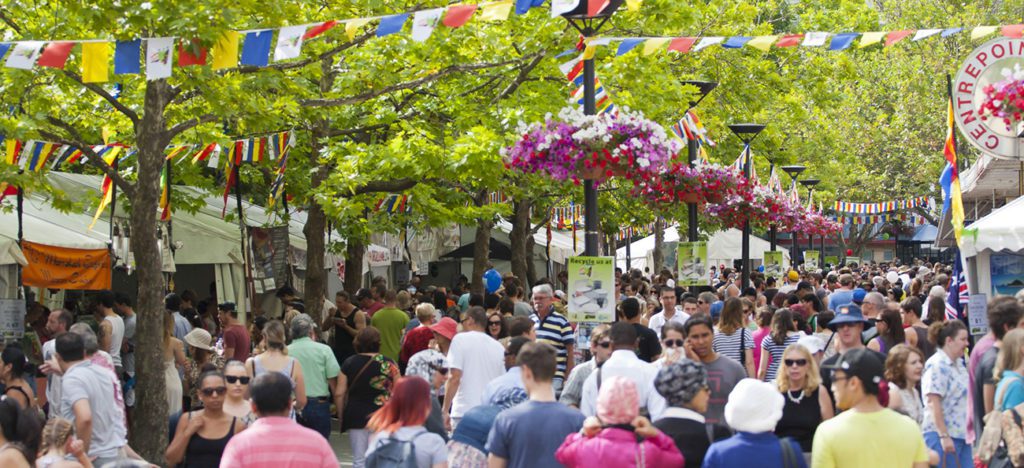The Canberra Multicultural Festival – after an electrifying performance from Indigenous group the Wiradjuri Echoes on their main stage – proudly proclaimed that this was its twenty-first birthday party and we were all invited. Garema Place certainly had an air of celebration about it: the walkways lined with tents, flags and people, despite the heat-heavy air. The festival bustled from the bus interchange all the way down City Walk to where the Canberra Centre ends at Akuna Street. The sight and the feeling of being in crowds of people like that is a rarity in our sleepy capital city, so to have those sensations in the place I usually drag myself to for grocery shopping was a fascinating juxtaposition.
Oh and the music! Three out of the four stages that I saw in the main city area of the festival contained performers. They were well-rehearsed acts and joyful in tone, starring everything from a Chinese children’s wind orchestra to a South African men’s acapella quintet who looked like they had more fun than the audience – and that was saying a lot! This was a vibrant addition to the overall experience of the festival which could justify a visit to simply walk around and take in the atmosphere. That is if you can bear to pass up the delicious food on offer.
The cuisines available ranged from an alarming number of ‘Chips-on-a-stick’ stalls – I counted five – to more niche representations of cultures and their food. The most notable of these originated from Ethiopia, Patagonia, Portugal and Scotland, where they were selling Haggis while bagpipes played. There was an interesting spread between recognisable local brands and community groups from Canberra and surrounds. An example of the former was Papa’s Peruvian street food – typically found in the Hamlet on Lonsdale street – which I cannot praise highly enough. Alongside seasoned professionals like Papa’s was the Croatia-Deakin Soccer Club, who clearly made a great effort to get out there and enlighten the rest of us with a taste of their country’s favourite meals.
There were also three of Canberra’s local breweries out in force, catching my eye mainly due to the 30-degree evening. They appeared to be making the most of the crowd’s thirst with very attractive options for beer and cider lovers alike. While I haven’t had the chance to sample every one of these companies, I would recommend Bent Spoke as a favourite of mine for a light and flavourful brew. These kinds of craft-beer or established Canberra eateries were certainly some of the priciest on the night, so if you’re trying to budget after O-Week but still want to give the festival a try then look towards the smaller and less branded fares: the food is going to be equally wonderful in most cases. As I was walking around, I grabbed some barbecue sweet corn from the Refugee Resettlement Committee tent, just one example of the kind of snack food that is the Multicultural Festival at its finest.
In the words of the director of the festival director, Azra Khan, in a recent radio interview: ‘How big is your appetite? What to say no to is going to be the biggest challenge for people!’ Whilst I didn’t have enough room to sample everything I would have liked to, that was certainly my only complaint. This festival creates a gorgeous atmosphere and a place for absolutely anyone in Canberra to enjoy, appreciate, and learn about food and music from many of the world’s most vibrant cultures. We are fortunate to have such a festival, given the current political climate of fear and uncertainty regarding our relationship to other countries, and our place within our own. This festival has an ability to attract such great performers and delicious food – it will hopefully continue for many more years to unite and educate all that flow in through its gates.
We acknowledge the Ngunnawal and Ngambri people, who are the Traditional Custodians of the land on which Woroni, Woroni Radio and Woroni TV are created, edited, published, printed and distributed. We pay our respects to Elders past and present. We acknowledge that the name Woroni was taken from the Wadi Wadi Nation without permission, and we are striving to do better for future reconciliation.
